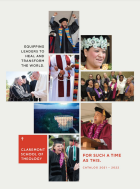Meeting someone at a moment of need requires a relationship that transcends traditional boundaries. Yet our own religious traditions are a source of radical compassion and empathy. From the Christian tradition students start with biblical studies, work through a spectrum of world Christianities and engage ethics and systematic theology.
From there you’ll focus on at least two other religions, and train in interreligious dialogue, counseling and comparative theology. Non-Christian students study their own sacred texts, religious history, theology and ethics, while cross-training in two other traditions. All students take classes in Clinical Pastoral Education, and spiritual care and counseling.
And all are prepared to enter the field via their denomination, vocation or religious body’s requirements – with the requirement of subtle, sophisticated, uplifting care deeply ingrained in their practice, ministry or ongoing education.
MDiv in Interfaith Chaplaincy Curriculum:
Theological Studies (required)* – 18-21 credits
THB3007 The Hebrew Bible in Context: An Introduction (3 credits)
TNT3003 The New Testament in Context: An Introduction (3 credits)
THC3007 History of World Christianities (3 credits)
TTH3036 Systematic Theology (3 credits)
TEC3001 Introduction to Christian Ethics (3 credits)
2 courses in a Religious Tradition other than one’s own (6 credits)
*Non-Christian students will work with their adviser to choose 18 units in:
Sacred Texts (3 credits)
History of a Particular Religious Tradition (3 credits)
Theology, Teaching, and Tenets (3 credits)
Religious and/or Faith-based Ethics (3 credits)
Courses in Another Religious Tradition (6 credits)
Interreligious Competencies – 9 credits
TIR3001 Interreligious Dialogue and Leadership (3 credits)
TSC3064 Interfaith Care and Counseling (3 credits)
TCT3XXX or TIR3XXX in Comparative Theology or Interreligious studies (3 credits)
Formation – 9 credits
TSF3XXX in Spiritual Formation (3 credits)
TSC3002 Clinical Pastoral Education** (6 credits)
Spiritual Care Requirements – 6 credits
TSC3004 Theories/Practices in Spiritual Care (3 credits)
TSC3035 Chaplaincy in Contexts (3 credits)
Spiritual Care Electives – 12 credits
Four TSC3XXX in spiritual care and counseling courses (12 credits)
Summative Course – 3 credits
TRE3040 Vocational Praxis (3 credits)
Free Electives – 12-15 credits (remaining credits to equal 72)
Each student is encouraged to choose their free electives to meet/satisfy their denominational/faith tradition’s expectations for endorsement as a chaplain as well as to prepare oneself for the student’s future employment goals. Since the requirements for employment as a chaplain vary according to specialty (hospital, hospice, prison, military, college, etc.), the student should keep informed about requirements, through consistent consultation with the relevant professional bodies.
TOTAL – 72 credits
**One “unit” of CPE is required in this degree. Each “unit” of CPE is worth 6 academic credits. The Association of Professional Chaplains requires 4 “units” of CPE for certification. Students apply for acceptance into an approved APCE site. Once accepted, the student enrolls in CST’s TSC3002 for 6 academic credits. With the support of their advisor, students may take additional units of CPE for 0-6 academic credits as free electives. When CPE is taken for academic credit through CST, the hospital/site fee is paid for by the school out of the tuition money. When CPE is taken for 0 academic credits, the student is responsible to pay for the CPE site fees.
NOTE: United Methodist students preparing for ordination must take UM classes totaling 12 credits: History, Doctrine, and Polity (2 credits each) Evangelism, and Mission (3 credits each).
Want to learn more?
Reach out to the Admissions Counselor for this program, Karen Gonzalez, by emailing kgonzalez@cst.edu or by using the below link to submit an inquiry form.



